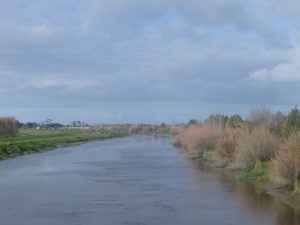Waikato dairy effluent breaches lead to $108,000 in fines
Two farmers and two farming companies were recently convicted and fined a total of $108,000 for environmental offending.
 The efforts of farmers to improve the health of the Piako River in Waikato region have been recognised.
The efforts of farmers to improve the health of the Piako River in Waikato region have been recognised.
The efforts of farmers to improve the health of the Piako River in the Waikato region have been recognised.
The award of the Waikato region's most improved river to the Piako River follows a significant effort by farmers in the catchment to lessen the environmental impact of their operations, says Waikato Regional Council chairperson Paula Southgate.
Southgate attended the Morgan Foundation's annual River Awards in Wellington last night where the award was presented.
"This work by farmers, landowners and industry groups in both the Piako catchment and other parts of the region, is crucial to improve the health of our precious waterways, lakes and groundwater, and should be celebrated," she says.
This year the most improved rivers were determined by the trend decline in dissolved inorganic nitrogen (DIN). The Piako showed a 6.8% trend decline in DIN over the ten years to 2014.
The foundation noted that the Piako catchment is dominated by pastoral farming - mainly dairying and stock finishing. The water quality monitoring site is downstream of Morrinsville and the town's wastewater discharge to the river, and a number of dairy company discharges also. The river flows out past Ngatea to the Firth of Thames.
"The Piako catchment is 95% pasture. It is one of the most intensively farmed (dairy) areas in New Zealand and always has been. Council records confirm ammonia and nitrates levels in the river have declined over the past 10 and 20 years. Improvements in dairy shed management practices have contributed to the observed improvement in water quality," the foundation said.
It noted dairy farmers have increasingly moved away from dairy shed oxidation ponds towards discharging treated effluent on to the land. The oxidation ponds had discharged into the nearest drain, and thus contributed ammonia and nitrogen to nearby waterways.
"Across the Waikato only five per cent of dairy farms now have oxidation ponds so the era of easy wins...is now probably over," the foundation said, adding that the source of 70% of nitrogen is from cow peeing in the paddocks "so further improvements are going to rely on changes in farm management practices".
Southgate says the council is working closely with the farming community and others in a variety of ways to lessen the sector's impacts on waterways, while potential regional plan changes to protect them were either being formulated or in the pipeline.
Mating wrapped up last month at the across-breed Beef Progeny Test on Pāmu’s Kepler Farm in Manapouri.
Libby Judson is a keeper of memories from an age gone by. Tim Fulton tells her story.
A New Zealand-first native tree study has highlighted the Bioeconomy Science Institute's position as a forestry research leader.
Hemp fibre processor Rubisco is relocating its core processing facility to Ashburton as part of a $20-$30 million expansion to leverage what it says is an accelerating global demand for sustainable and renewable fibres.
Tradition meets some of the latest in technology at the 2026 East Coast Farming Expo.
OPINION: Trade Minister Todd McClay and the trade negotiator in government have presented Kiwis with an amazing gift for 2026 - a long awaited and critical free trade deal with India.
President Donald Trump’s decision to impose tariffs on imports into the US is doing good things for global trade, according…
Seen a giant cheese roll rolling along Southland’s roads?